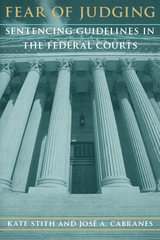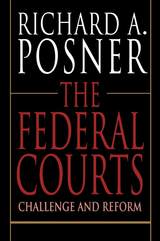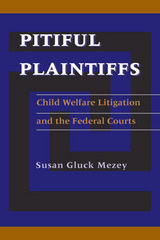
Fear of Judging is the first full-scale history, analysis, and critique of the new sentencing regime. The authors show that the present system has burdened the courts, dehumanized the sentencing process, and, by repressing judicial discretion, eroded the constitutional balance of powers. Eschewing ideological or politically oriented critiques of the Guidelines and offering alternatives to the current system, Stith and Cabranes defend a vision of justice that requires judges to perform what has traditionally been considered their central task—exercising judgment.

The federal courts are the world’s most powerful judiciary and a vital element of the American political system. In recent decades, these courts have experienced unprecedented growth in caseload and personnel. Many judges and lawyers believe that a “crisis in quantity” is imperiling the ability of the federal judiciary to perform its historic function of administering justice fairly and expeditiously.
In a substantially revised edition of his widely acclaimed 1985 book The Federal Courts: Crisis and Reform, Chief Judge Richard A. Posner of the U.S. Court of Appeals for the Seventh Circuit provides a comprehensive evaluation of the federal judiciary and a detailed program of judicial reform. Drawing on economic and political theory as well as on legal analysis and his own extensive judicial experience, Posner sketches the history of the federal courts, describes the contemporary institution, appraises the concerns that have been expressed with the courts’ performance, and presents a variety of proposals for both short-term and fundamental reform. In contrast to some of the direr prophecies of observers of the federal courts, Posner emphasizes the success of these courts in adapting to steep caseload growth with minimum sacrifice in quality.
Although the book ranges over a variety of traditional topics in federal jurisdiction, the focus is steady on federal judicial administration conceived of as an interdisciplinary approach emphasizing system rather than doctrine, statistics rather than impressions, and caseload rather than cases. Like the earlier edition, this book promises to be a landmark in the empirical study of judicial administration.


Focusing on a class action lawsuit against the Illinois child welfare system (B. H. v. Johnson), Pitiful Plaintiffs examines the role of the federal courts in the child welfare policymaking process and the extent to which litigation can achieve the goal of reforming child welfare systems.
Beginning in the 1970s, children’s advocates asked the federal courts to intervene in the child welfare policymaking process. Their weapons were, for the most part, class action suits that sought widespread reform of child welfare systems. This book is about the tens of thousands of abused and neglected children in the United States who enlisted the help of the federal courts to compel state and local governments to fulfill their obligations to them. Based on a variety of sources, the core of the research consists of in-depth, open-ended interviews with individuals involved in the Illinois child welfare system, particularly those engaged in the litigation process, including attorneys, public officials, members of children’s advocacy groups, and federal court judges. The interviews were supplemented with information from legal documents, government reports and publications, national and local news reports, and scholarly writings. Despite the proliferation of child welfare lawsuits and the increasingly important role of the federal judiciary in child welfare policymaking, structural reform litigation against child welfare systems has received scant scholarly attention from a political science or public policy perspective. Mezey’s comprehensive study will be of interest to political scientists and public policy analysts, as well as anyone involved in social justice and child welfare.

Go ahead and try to make a federal case of it. That may seem to be your right, but as Larry Yackle reveals in Reclaiming the Federal Courts, the guardians of that right don’t see it that way. A systematic study of the role the federal courts play in enforcing the Constitution, this powerful book shows how the current conservative Supreme Court has undermined that role by restricting citizens’ access to these courts.
Yackle focuses on judicially created doctrines that channel certain cases away from the federal courts (which tend to hold government power in check) and into state courts (which tend to allow government a relatively free hand). In doing so, he clearly shows how seemingly arcane and confusing legal technicalities actually tilt the delicate balance between government power and individual liberty in the United States. As he traces the historical underpinnings of the federal judicial system, Yackle explains how access to the federal courts in federal-question cases is intertwined with the most fundamental elements of American Jurisprudence—Legal Formalism, Legal Realism, Legal Process, and the Civil Rights Movement—as well as with the recent conservative retrenchment. He goes on to examine specific modern doctrines. Here we see how the Rehnquist Court’s restrictive rules deny citizens standing to sue in federal court, disclaim the federal courts’ jurisdiction even when standing is conceded, channel cases away from the federal courts even when they have jurisdiction, and frustrate the right to petition the federal courts for a writ of habeas corpus—perhaps the most fundamental right of any citizen.
Yackle’s straightforward style makes his description and analysis of existing law intelligible to students and others who wish to understand how the federal judicial system actually functions—or fails to function. The book concludes with concrete recommendations for congressional action to correct the subtle but significant injustice that Yackle so clearly and cogently exposes.
READERS
Browse our collection.
PUBLISHERS
See BiblioVault's publisher services.
STUDENT SERVICES
Files for college accessibility offices.
UChicago Accessibility Resources
home | accessibility | search | about | contact us
BiblioVault ® 2001 - 2024
The University of Chicago Press









